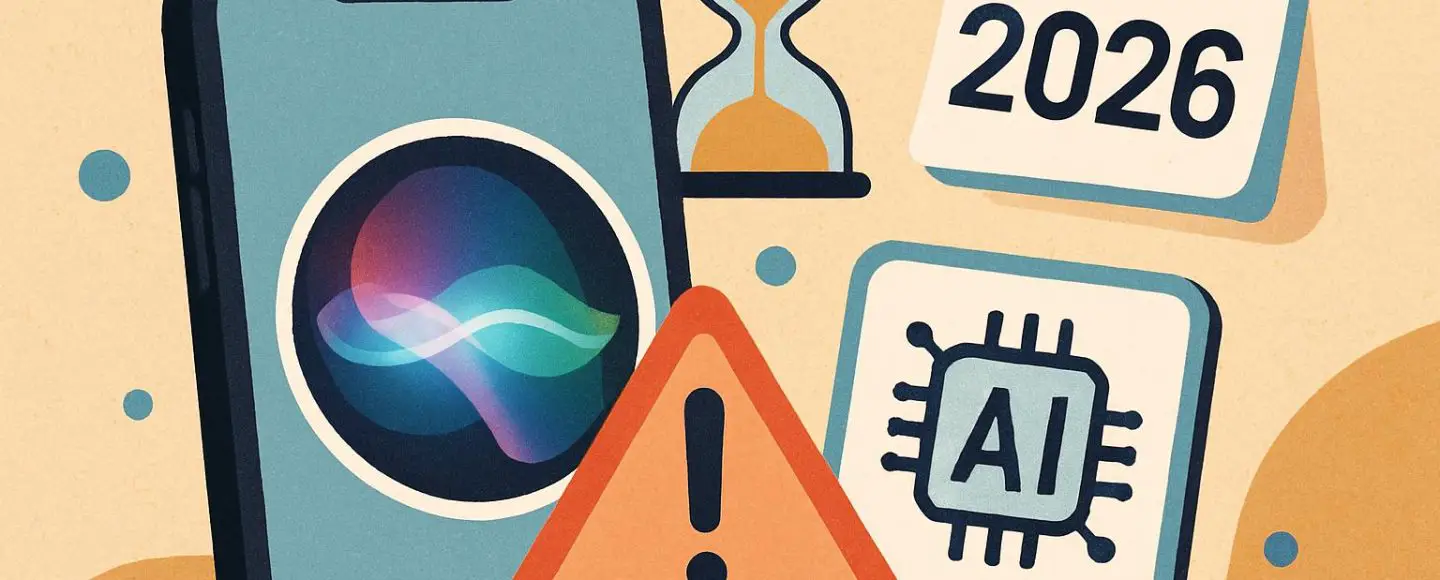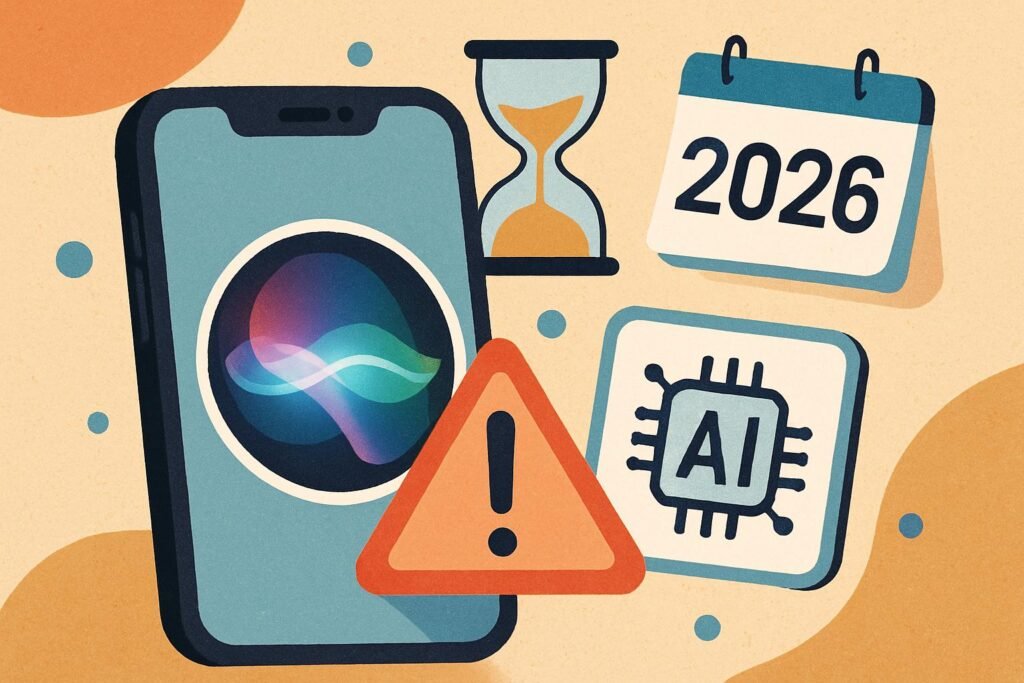
Siri AI Upgrade Delayed to 2026
Apple has officially confirmed that the Siri AI upgrade is delayed to 2026, pushing back one of its most anticipated advancements in generative artificial intelligence. This decision reinforces Apple’s privacy-first strategy and methodical integration approach. Unlike the rapid AI rollouts from Google, Amazon, and Microsoft, Apple is prioritizing seamless system-wide implementation and trusted user experiences. While this delay signals caution, it also sets the stage for a deeply integrated, upgraded Siri expected to redefine voice interaction across Apple devices in 2026.
Key Takeaways
- Siri’s generative AI upgrade is now scheduled for spring 2026 due to integration and privacy concerns.
- The upcoming Siri will feature contextual awareness, conversational intelligence, and deeper Apple ecosystem connectivity.
- Apple’s strategy differs from the aggressive AI moves by Google’s Gemini and Amazon Alexa updates.
- This delay underscores Apple’s focus on on-device AI that protects user data and enables real-time performance.
Why Apple Is Delaying the Siri AI Upgrade
Multiple challenges have contributed to the delay. One of the most critical is integrating generative AI capabilities across a wide range of platforms, including iOS, iPadOS, macOS, watchOS, and visionOS. This deep integration requires time because Apple wants a consistent and fully optimized experience across all devices.
Privacy is another major factor. Apple is committed to minimizing reliance on cloud processing in favor of on-device performance. This decision means the AI models must be lightweight yet powerful enough to function locally. Internal architecture requires redesigning to support these goals without compromising speed or accuracy.
While competitors are quickly rolling out AI features to capture early market share, Apple prefers to move at a measured pace. The company aims to deliver an assistant that meets its high standards for user trust and quality. This delay also highlights the broader discussion within the industry about whether speed or precision is more valuable in AI development.
What the Upgraded Siri Will Do
Once Siri is updated, it will shift from a transactional voice tool to a contextual assistant capable of handling in-depth, multi-step interactions. Key upgrades include:
- Contextual Awareness: Siri will retain memory across sessions and understand the intent behind user prompts.
- Task Management: Siri will assist with writing emails, generating summaries, scheduling tasks, and handling complex queries.
- Deep Device Integration: The AI will tie into various system functions across devices like iPhone, Mac, and Apple Watch, unlocking new levels of productivity and automation.
- On-Device AI Models: Local processing will maintain privacy and ensure swift response times while reducing reliance on cloud servers.
This is part of Apple’s broader vision where Siri transforms into a versatile assistant that supports life across everyday activities and professional tasks. Some details were also discussed during the announcement of Apple Intelligence AI, which hints at where Siri fits into the company’s expanding intelligent features.
Apple vs Google, Amazon, and Microsoft: AI Assistant Comparison
Apple is holding back its launch while rivals place their generative models front and center. Here is a side-by-side comparison of the top four players in 2024:
| Feature | Siri (Apple) | Gemini (Google) | Alexa LLM (Amazon) | Copilot (Microsoft/OpenAI) |
|---|---|---|---|---|
| Privacy Focus | High (on-device processing) | Moderate (cloud-centric) | Moderate (partial integration) | Dependent on Microsoft ecosystem |
| Conversation Quality | Expected to improve in 2026 | Live multimodal search and response | Fluent but command focused | Task-driven and highly capable |
| Device Integration | Tight integration across Apple products | Primarily Android and Pixel | Focused on Echo and Fire devices | Integrated with Windows and Office |
| Availability | Set for 2026 | Live on select devices now | Rolling out in 2024 | Available in Windows 11 and Microsoft 365 |
In 2024, Siri trails in features and performance. Yet, its focus on privacy and full-device connectivity could offer long-term advantages. This gap between capability and trust was explored in depth in the discussion around Siri’s recent decline and the AI crossroads Apple faces.
User Expectations and the Current Gap
Consumers are interacting with AI more frequently and expect voice assistants to keep pace. A report from Statista estimates over 8.4 billion digital voice assistants in use globally by the end of 2024. A growing number of users expect multi-turn conversations, contextual understanding, and intelligent task assistance.
At present, Siri often fails to meet those expectations. Competing assistants from Google and Microsoft already offer tools like meeting transcript summaries and in-app productivity boosts. Microsoft’s Copilot can handle real-time document creation and email responses. Google’s Gemini assistant supports continuous conversations and app control in Android.
Meanwhile, Siri still depends heavily on direct commands and lacks retention in conversation threads. Some users have explored temporary alternatives like setting ChatGPT as a Siri backup to fill in the functionality gap. These solutions highlight user demand for smarter voice interaction.
What This Means for Users Across Apple Devices
The push to 2026 means users will need to wait for major advancements in voice control and AI mobility. Here is how the delay will impact different aspects of the Apple environment:
- iOS 18 will not include major Siri upgrades: It will bring only incremental improvements. Advanced generative tasks like summary writing will not appear until 2026.
- Vision Pro users may see limited AI support: Natural interface interaction through voice will be affected by the delay in advanced Siri features.
- Other devices remain manual focused: Without enhanced voice AI, many tasks across iPad, Mac, and Apple Watch will continue to require manual input.
- Newer chip models may be required: Some AI benefits may only reach devices released after 2024 that have the necessary processing capabilities.
In the short term, the AI upgrade delay keeps Apple behind competitors offering smoother and more advanced assistants. For users eager for change, the wait could be frustrating. Still, Apple’s careful approach may pay off in terms of long-term reliability and user trust. Insight into that vision can be found in the company’s broader work on Apple Intelligence.
FAQs About Siri’s AI Upgrade Delay
Why is Apple delaying the Siri AI upgrade?
Apple is taking extra time to ensure the upgrade works seamlessly across its ecosystem. The company also wants to keep AI processing on-device to protect user privacy.
What will Siri’s new capabilities include?
Siri will become more conversational, handle complex tasks more effectively, and respond based on previous interactions to deliver context-rich responses.
How does Siri compare to Alexa and Google Assistant in 2024?
Alexa and Google Assistant currently offer more advanced AI conversations and features. Siri still provides high privacy but lacks competitive generative capabilities.
What devices will support the upgraded Siri in 2026?
Devices like iPhone, Mac, iPad, Apple Watch, and Vision Pro will support the upgraded Siri, although some features might depend on the device’s hardware.
Will users need new hardware?
Potentially. Devices equipped with newer Apple Silicon or A-series chips introduced after 2024 are more likely to support the full range of Siri’s AI features.
Is the Siri upgrade part of Apple Intelligence?
Yes. The upgrade is a key component of Apple’s broader “Apple Intelligence” initiative, which aims to integrate AI across apps, services, and user interactions.
Will Siri work offline with the new AI features?
Some AI functions will work offline using on-device processing. More complex tasks may still require a secure cloud connection.
Can Siri summarize content or generate text?
Yes. Siri will gain generative capabilities like summarizing articles, drafting messages, and rewriting text based on user intent.
How is Apple ensuring AI safety in Siri?
Apple uses on-device processing, encryption, and differential privacy to limit data exposure. It also minimizes reliance on third-party models.
Will Siri understand multiple languages better?
Yes. The upgraded Siri is expected to improve multilingual comprehension, translation, and code-switching during conversations.
How will developers benefit from the new Siri?
Developers can integrate new SiriKit APIs to allow their apps to take advantage of voice commands, generative suggestions, and smarter task handling.
Can Siri automate more tasks across apps?
Yes. Siri will handle multi-step tasks like booking appointments, summarizing calendar changes, or sending context-aware follow-ups across apps.
Will older devices receive a limited version of Siri AI?
Yes. Older iPhones and Macs may get partial updates, but performance will be restricted due to hardware limitations.
When will the new Siri be fully released?
Apple plans to gradually roll out the upgraded Siri starting in late 2025, with full integration expected by mid-2026.
References
Brynjolfsson, Erik, and Andrew McAfee. The Second Machine Age: Work, Progress, and Prosperity in a Time of Brilliant Technologies. W. W. Norton & Company, 2016.
Marcus, Gary, and Ernest Davis. Rebooting AI: Building Artificial Intelligence We Can Trust. Vintage, 2019.
Russell, Stuart. Human Compatible: Artificial Intelligence and the Problem of Control. Viking, 2019.
Webb, Amy. The Big Nine: How the Tech Titans and Their Thinking Machines Could Warp Humanity. PublicAffairs, 2019.
Crevier, Daniel. AI: The Tumultuous History of the Search for Artificial Intelligence. Basic Books, 1993.


